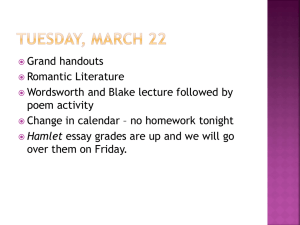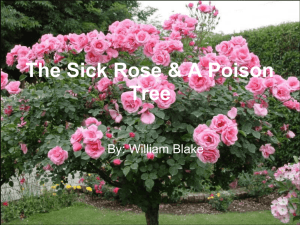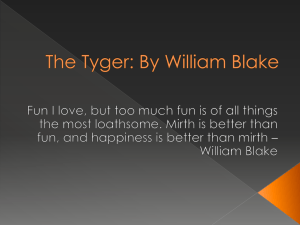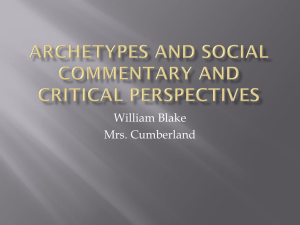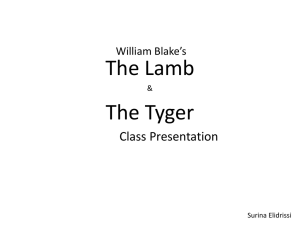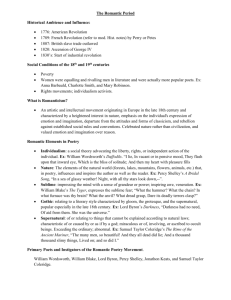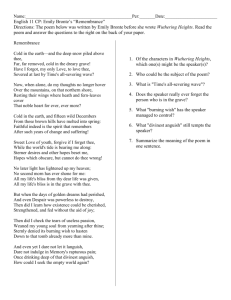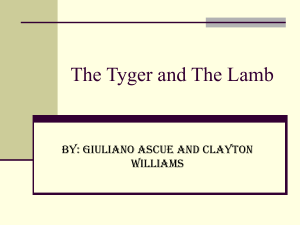FOR MONDAY, 3.11.13: Samuel Taylor Coleridge Born in rural
advertisement
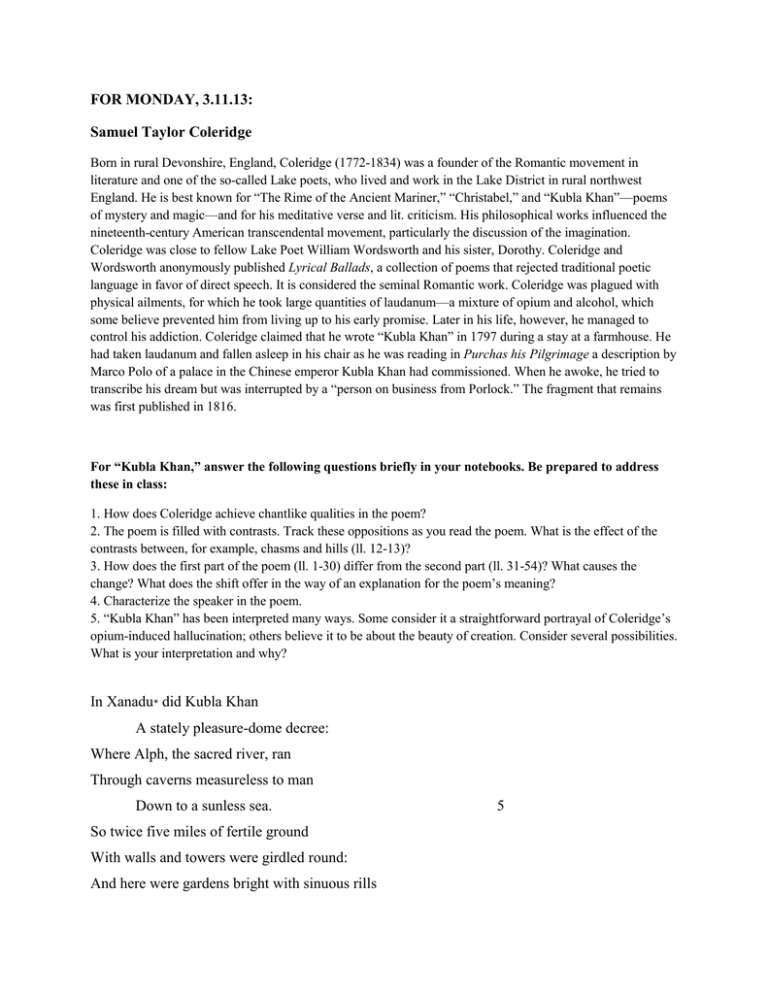
FOR MONDAY, 3.11.13: Samuel Taylor Coleridge Born in rural Devonshire, England, Coleridge (1772-1834) was a founder of the Romantic movement in literature and one of the so-called Lake poets, who lived and work in the Lake District in rural northwest England. He is best known for “The Rime of the Ancient Mariner,” “Christabel,” and “Kubla Khan”—poems of mystery and magic—and for his meditative verse and lit. criticism. His philosophical works influenced the nineteenth-century American transcendental movement, particularly the discussion of the imagination. Coleridge was close to fellow Lake Poet William Wordsworth and his sister, Dorothy. Coleridge and Wordsworth anonymously published Lyrical Ballads, a collection of poems that rejected traditional poetic language in favor of direct speech. It is considered the seminal Romantic work. Coleridge was plagued with physical ailments, for which he took large quantities of laudanum—a mixture of opium and alcohol, which some believe prevented him from living up to his early promise. Later in his life, however, he managed to control his addiction. Coleridge claimed that he wrote “Kubla Khan” in 1797 during a stay at a farmhouse. He had taken laudanum and fallen asleep in his chair as he was reading in Purchas his Pilgrimage a description by Marco Polo of a palace in the Chinese emperor Kubla Khan had commissioned. When he awoke, he tried to transcribe his dream but was interrupted by a “person on business from Porlock.” The fragment that remains was first published in 1816. For “Kubla Khan,” answer the following questions briefly in your notebooks. Be prepared to address these in class: 1. How does Coleridge achieve chantlike qualities in the poem? 2. The poem is filled with contrasts. Track these oppositions as you read the poem. What is the effect of the contrasts between, for example, chasms and hills (ll. 12-13)? 3. How does the first part of the poem (ll. 1-30) differ from the second part (ll. 31-54)? What causes the change? What does the shift offer in the way of an explanation for the poem’s meaning? 4. Characterize the speaker in the poem. 5. “Kubla Khan” has been interpreted many ways. Some consider it a straightforward portrayal of Coleridge’s opium-induced hallucination; others believe it to be about the beauty of creation. Consider several possibilities. What is your interpretation and why? In Xanadu* did Kubla Khan A stately pleasure-dome decree: Where Alph, the sacred river, ran Through caverns measureless to man Down to a sunless sea. So twice five miles of fertile ground With walls and towers were girdled round: And here were gardens bright with sinuous rills 5 Where blossomed many an incense-bearing tree; And there were forests ancient as the hills, 10 Enfolding sunny spots of greenery. But oh! that deep romantic chasm which slanted Down the green hill athwart a cedarn cover! A savage place! as holy and enchanted As e’er beneath a waning moon was haunted 15 By woman wailing for her demon-lover! And from this chasm, with ceaseless turmoil seething, As if this earth in fast thicks pants were breathing, A mighty fountain momently was forced, Amid whose swift half-intermittent burst 20 Huge fragments vaulted like rebounding hail, Of chaffy grain beneath the thresher’s flail: And ‘mid these dancing rocks at once and eve It flung up momently the sacred river. Five miles meandering with a mazy motion 25 Through wood and dale the sacred river ran, Then reached the caverns measureless to man, And sank in tumult to a lifeless ocean: And ‘mid this tumult Kubla heard from far Ancestral voices prophesying war! 30 The shadow of the dome of pleasure Floated midway on the waves; Where was heard the mingled measure From the fountain and the caves. It was a miracle of rare device, A sunny pleasure-dome with caves of ice! A damsel with a dulcimer In a vision once I saw: 35 It was an Abyssinian* maid, And on her dulcimer she played, 40 Singing of Mount Abora*. Could I revive within me Her symphony and song, To such a deep delight ‘twould win me, That with music loud and long, 45 I would build that dome in air, That sunny dome! those caves of ice! And all who heard should see them there, And all should cry, Beware! Beware! His flashing eyes, his floating hair! 50 Weave a circle round him thrice, And close your eyes with holy dread, For he on honey-dew hath fed, And drunk the milk of Paradise. [1798; 1816] * Xanadu was the summer capital of the Chinese Yuan dynasty, ruled by the Mongolian emperor Kublai Khan. * Ethiopian * Ethiopian mountain referred to as “true Paradise under the Ethiop Line” in Milton’s Paradise Lost. FOR MONDAY, 3.11.13: William Wordsworth Wordsworth (1770-1850) is one of the most famous and influential poets of the Western world and one of the premier Romantics. Widely known for his reverence of nature and the power of his lyrical verse, he lived in the Lake District of northern England, where he was inspired by the natural beauty of the landscape. With Coleridge, he published Lyrical Ballads in 1798; the collection which changed the direction of English poetry, begins with “The Rime of the Ancient Mariner” and includes Wordsworth’s “Lines Composed a Few Miles Above Tintern Abbey.” Among Wordsworth’s other most famous works are “The World Is Too Much with Us,” a sonnet; “Ode: Intimations of Immortality”; and “The Prelude, or Growth of a Poet’s Mind,” an autobiographical poem. In the sonnet, “London, 1802,” the speaker addresses and eulogizes the poet John Milton. Answer the following questions for “London, 1802,” briefly in your notebooks. Be prepared to address these in class: 1. “London, 1802” is an example of a classic Petrarchan sonnet: it has fourteen lines written in iambic pentameter; its rhyme scheme is abba, abba, cdde, ce. As you know, the traditional sonnet poses a situation or question in the octet that is resolved or answered in the sestet. What situation does Wordsworth present in “London, 1802”? What resolution does he suggest? 2. Wordsworth often uses single words to represent bigger ideas, a literary device called metonymy. What institutions do “altar,” “sword,” “pen,” and “fireside” represent? 3. Wordsworth uses similes to present the qualities in Milton that he believes would help England out of its stagnant selfishness. What is the effect of this figurative language? What is the extra level of meaning it creates? 4. According to this poem, what potential does the artist have for improving society? How must the artist behave to make that potential become real and useful? 5. This poem is unusually nationalistic for a Romantic writer. What might explain Wordsworth’s focus on England’s heritage and one of its great poets? Milton! thou should’st be living at this hour: England hath need of thee: she is a fen Of stagnant waters: altar, sword, and pen, Fireside, the heroic wealth of hall and bower, Have forfeited their ancient English dower 5 Of inward happiness. We are selfish men; Oh! raise us up, return to us again; And give us manners, virtue, freedom, power. Thy soul was like a star, and dwelt apart: Though hadst a voice whose sound was like the sea: 10 Pure as the naked heavens, majestic, free, So didst thou travel on life’s common way, In cheerful godliness; and yet thy heart The lowliest duties on herself did lay. [1802] FOR MONDAY, 3.11.13: William Blake Obscure during his lifetime, Blake (1757-1827) has come to be recognized as one of the most significant poets and artist in English history. Born in London and educated at home by parents who held nonconformist religious and political beliefs, Blake developed highly controversial views about spirituality, women’s rights, and personal liberty that informed much of his work. On occasion, his views—and his willingness to express and publish them—led to difficulties with the law, including an arrest in 1803 for “uttering seditious statements against the Crown.” Following an apprenticeship to an engraver, Blake began experimenting with relief engraving—a technique he called “illuminated printing”—to illustrate both his own books and worls such as Milton’s Paradise Lost and Dante’s The Divine Comedy. “London” comes from Songs of Innocence and Experience (1794), a response to his earlier collection of poems, Songs of Innocence (1789). For “London,” answer the following questions briefly in your notebooks. Be prepared to address these in class: 1. The poem takes the form of a walking tour through London. How does Blake use visual and auditory imagery to both convey the atmosphere in the streets and create a sense of foreboding? 2. What do you make of the repetition of the words “mark” and “marks” in the first stanza? Blake uses “mark” in line 3 to mean “notice.” Consider other possible meaning of the word. 3. The last two stanzas introduce a series of exploited persons; chimney sweepers, soldiers, and prostitutes. What do you think he means by “Marriage hearse”? 4. The poem’s third stanza is an acrostic; the first letters of the first words in each line spell out “HEAR.” In addition, lines 8 and 13 both end with the word “hear.” What does Blake want the reader to hear? What is this technique effective in this part of the poem? 5. What is your interpretation of “mind-forged manacles” (l. 8)? How might that phrase comment on the overindustrialized world of London in the eighteenth century? 6. “London,” like many of Blake’s poems, has been interpreted in various ways. Critic Camille Paglia, writes the following about “London” in Break, Blow, Burn: “[“London” is Blake’s] expose of commercial society.” What is your view? Why? Can you see another way? How does this poem fit into a dialogue with Coleridge and Wordsworth’s ideas and writing? I wander through each chartered* street, Near where the chartered Thames does flow, And mark in every face I meet Marks of weakness, marks of woe. In every cry of every man, 5 In every Infant’s cry of fear, In every voice, in every ban, The mind-forged manacles I hear. How the Chimney-sweeper’s cry Every black’ning church appalls; 10 And the hapless Soldier’s sigh Run in blood down Palace walls. Bust most through midnight streets I hear How the youthful Harlot’s curse Blasts the new-born Infant’s tear, 15 And blights with plagues the Marriage hearse. [1794] *Defined by law. FOR WEDNESDAY, 3.13.12 William Blake, cont’d. For “The Lamb” answer the following questions briefly in your notebooks. Be prepared to address these in class: 1. This poem is from Blake’s Songs of Innocence. Describe its tone. How do the meter, rhyme, and repetition help to characterize the speaker’s voice? 2. Why is it significant that the animal addressed by the speaker is a lamb? What symbolic value would be lost if the animal were, for example, a doe? 3. How does the second stanza answer the question raised in the first? What is the speaker’s view of the creation? Little Lamb, who made thee? Dost thou know who made thee? Gave thee life, and bid thee feed By the stream and o’er the mead; Gave thee clothing of delight, 5 Softest clothing, wooly, bright; Gave thee such a tender voice, Making all the vales rejoice? Little Lamb, who made thee? Dost thou know who made thee? 10 Little Lamb, I’ll tell thee, Little Lamb, I’ll tell thee: He is called by thy name, For he calls himself a Lamb. He is meek, and he is mild; 15 He became a little child. I a child, and thou a lamb, We are called by his name. Little Lamb, God bless thee! Little Lamb, God bless thee! 20 FOR WEDNESDAY, 3.13.13 For “The Tyger,” answer the following questions briefly in your notebooks. Be prepared to address these in class: 1. This poem from Blake’s Songs of Experience is often paired with “The Lamb.” Describe the poem’s tone. Is the speaker’s voice the same here as in “The Lamb”? Which words are repeated, and how do they contribute to the tone? 2. What is revealed about the nature of the tiger by the words used to describe its creation? What do you think the tiger symbolizes? 3. Unlike in “The Lamb,” more than one question is raised in “The Tyger.” What are these questions, and are they answered? 4. Compare the rhythms in “The Lamb” and “The Tyger.” Each basically uses a seven-syllable line, but the effects are very different. Why? 5. Using these two poems as the basis of your discussion, describe what distinguishes innocence from experience. Tyger! Tyger! Burning bright In the forests of the night, What immortal hand or eye Could frame thy fearful symmetry? In what distant deeps or skies Burnt the fire of thine eyes? On what wings dare he aspire? What the hand dare seize the fire? And what should, and what art, Could twist the sinews of thy heart? And when thy heart began to beat, What dread hand? and what dread feet? What the hammer? what the chain? In what furnace was thy brain? What the anvil? what dread grasp Dare its deadly terrors clasp? When the stars threw down their spears, And watered heaven with their tears, Did he smile his work to see? Did he who made the Lamb make thee? Tyger! Tyger! Burning bright In the forests of the night, What immortal hand or eye Dare frame thy fearful symmetry?

